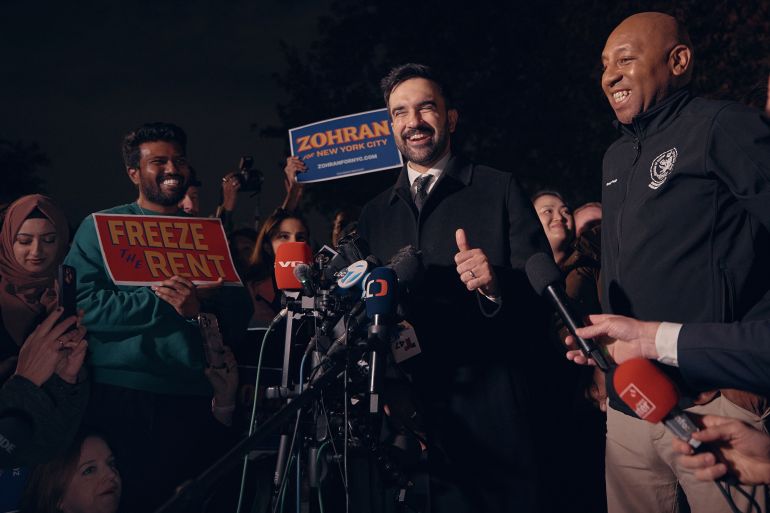Mamdani’s win raises hopes of change in Uganda, the land of his birth
Zohran Mamdani’s election as New York City’s mayor inspires politicians and youths in Uganda, where an authoritarian president is seeking to extend his nearly 40-year rule.

By Tim Hume and News Agencies
Published On 5 Nov 20255 Nov 2025
Save
Zohran Mamdani’s stunning victory in New York City’s mayoral race was built on a promise of hope and political change, a message that is resonating loudly with the people in Uganda, where he was born.
The 34-year-old leftist’s decisive win in the United States’ largest metropolis on Wednesday was celebrated by many in Uganda’s capital Kampala, the city where Mamdani was born in 1991.
Recommended Stories
list of 4 itemsend of list
For many Ugandans, the unlikely rise of Mamdani – a young Muslim with roots in Africa and South Asia – in the world’s most powerful democracy carries an inspirational message in a country where an authoritarian leader has been ruling since even before Mamdani was born.
Uganda’s 81-year-old President Yoweri Museveni is seeking a seventh term in January elections as he looks to extend his nearly 40-year rule. He has rejected calls to retire, leading to fears of a volatile political transition.
“It’s a big encouragement even to us here in Uganda that it’s possible,” Joel Ssenyonyi, a 38-year-old opposition leader in the Parliament of Uganda, told The Associated Press.
He said that while Ugandans, who are facing repressive political conditions, had “a long way to get there”, Mamdani’s success “inspires us”.

Mamdani left Uganda when he was five to follow his father, political theorist Mahmood Mamdani, to South Africa, and later moved to the US. He kept his Ugandan citizenship even after he became a naturalised US citizen in 2018, according to AP.
Advertisement
The family maintains a home in Kampala, to which they regularly return and visited earlier this year to celebrate Mamdani’s marriage.
‘We celebrate and draw strength’
While Mamdani, a self-described democratic socialist, has vowed to tackle inequality and push back against the xenophobic rhetoric of US President Donald Trump, opposition politicians in Uganda face different challenges.
Museveni has been cracking down on his opponents ahead of next year’s elections, as he has in the lead-up to previous polls.
In November last year, veteran opposition figure Kizza Besigye, who has stood against Museveni in four elections, and his aide, Obeid Lutale, were abducted in Nairobi, Kenya, before being arraigned in a military court in Kampala on treason charges. The pair have since repeatedly been denied bail, despite concerns raised by the United Nations’ human rights officials.
Other opposition figures have also faced crackdowns.
Tens of supporters of the National Unity Platform (NUP) party, led by 43-year-old entertainer Robert Kyagulanyi, popularly known as Bobi Wine, have been convicted by Uganda’s military courts for various offences.
“From Uganda, we celebrate and draw strength from your example as we work to build a country where every citizen can realise their grandest dreams regardless of means and background,” Wine wrote on X as he sent his “hearty congratulations” to Mamdani.
Robert Kabushenga, a retired Ugandan media executive who is friendly with the Mamdani family, told AP that Mamdani’s win was “a beacon of hope” for those fighting for change in Uganda, especially the younger generations.
Describing the new mayor-elect as belonging to “a tradition of very honest and clear thinkers who are willing to reimagine … politics”, Kabushenga said Mamdani’s victory underlined that “we should allow young people the opportunity to shape, and participate in, politics in a meaningful way”.
Okello Ogwang, an academic who once worked with Mamdani’s father at Kampala’s Makerere University, said his son’s success was an instructive reminder to Uganda “that we should invest in the youth”.
“He’s coming from here,” he said. “If we don’t invest in our youth, we are wasting our time.”
Anthony Kirabo, a 22-year-old psychology student at Makerere University, said Mamdani’s win “makes me feel good and proud of my country because it shows that Uganda can produce some good leaders”.
“Seeing Zohran up there, I feel like I can also make it,” he said.

